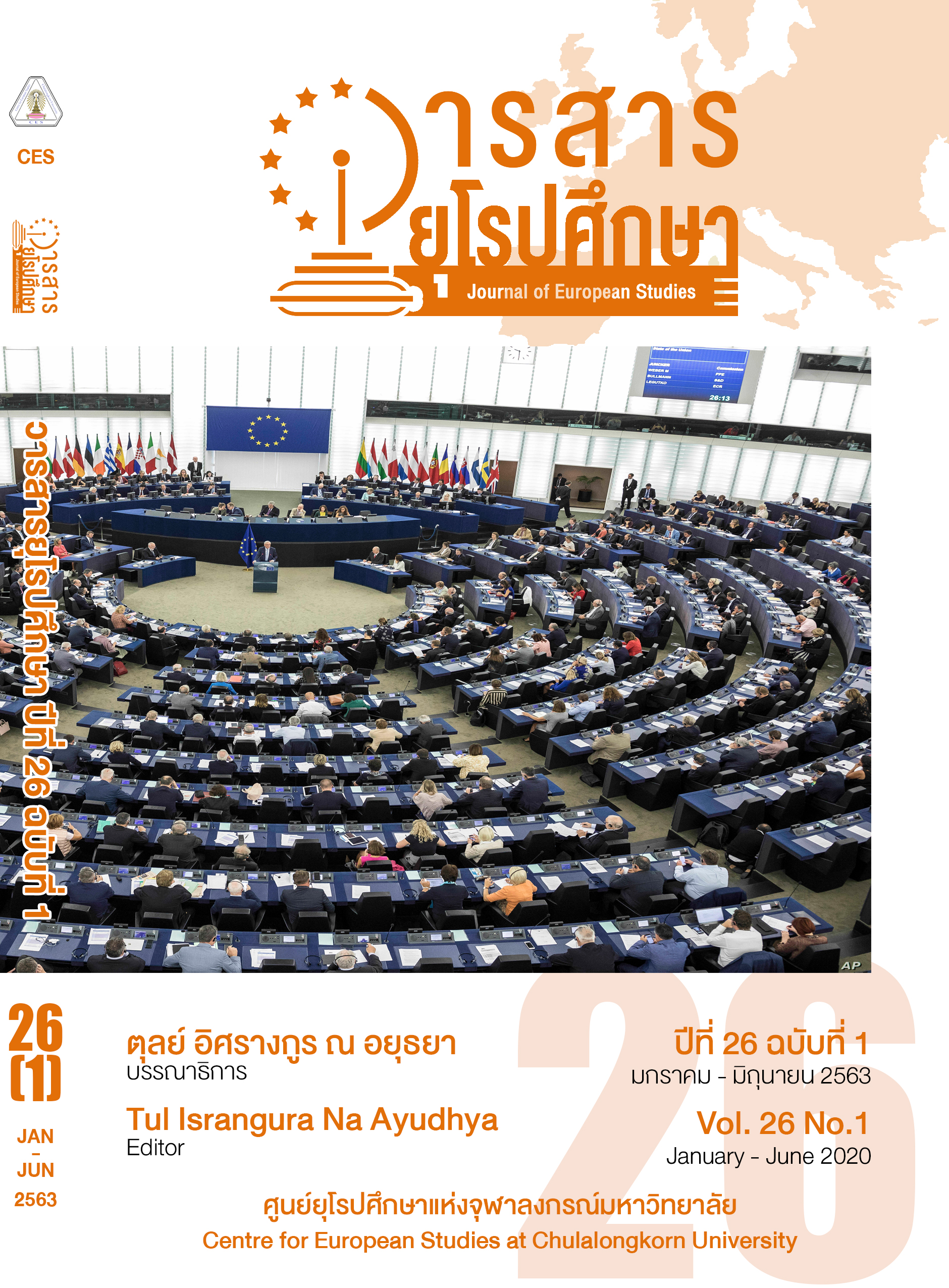How the Far-Right Extremists 'Scapegoat' their Political Opponents in Mass Media:
A Hungarian Case Study
คำสำคัญ:
right-wing populism, illiberal democracy, George Soros, Viktor Orbánบทคัดย่อ
The media have become a powerful propaganda tool due to the technological disruption in the present day. Many governments tend to change their techniques from media censorship to creation of their own propaganda media. Taking the Hungarian Prime Minister, Viktor Orban, as an example, this article aims to illustrate how a right-wing populist, uses the government-controlled media, such as billboard campaigns and national consultation letters, to attack his political opponent George Soros. Different types of media platforms have been used to either spread false stories or threaten refugees and migrants. They further exaggerate that George Soros cooperates with the European Union to support refugees and migrants to enter Europe. Furthermore, Prime Minister Orbán and the Fidesz Party empowered the mass media to strategically politicize certain historical events in order to tighten their grips of political power, which succeeded in shifting Hungary into an ‘illiberal democracy state’.
This paper explores various aspects from literature on European Studies. Firstly, it adds a sheer amount of interdisciplinary research examining how right-wing populists use the media to legitimate their ruling and policy implementation. Secondly, the article supplements a vast body of analytical research identifying a set of political propaganda and discourses that have been conducted through the media. Finally, this article distinctively uses an in-depth case study analysis to relate between causes and factors.
เอกสารอ้างอิง
About Hungary. “Here's the questionnaire that allows the people to have their say on the Soros Plan.” Last modified September 29, 2017. http://abouthungary.hu/news-in-brief/national-consultation-on-the-soros-plan/ (accessed on November 24, 2019).
Anderson, Benedict. Imagined communities: Reflections on the Origin and Spread of Nationalism. London; New York: Verso, 1991.
Beauchamp, Zack. “Hungary Just Passed a ‘Stop Soros’ Law That Makes It Illegal to Help Undocumented Migrants.” Vox, Jun 22, 2018. https://www.vox.com/policy-and-politics/2018/6/22/17493070/hungary-stop-soros-orban (accessed on January 17, 2020).
Beauchamp, Zack. “It happened there: how democracy died in Hungary.” VOX, Sep 13, 2018. https://www.vox.com/policy-and-politics/2018/9/13/17823488/hungary-democracy-authoritarianism-trump (accessed on January 16, 2020).
Bershidsky, Leonid. “Soros’ Migration Plot Is Underfunded and Imaginary.” Bloomberg, November 6, 2018. https://www.bloomberg.com/opinion/articles/2018-11-06/soros-plot-to-import-migrants-is-underfunded-and-imaginary (accessed on November 13, 2019).
Brady, Anne-Marie. “Mass Persuasion as a Means of Legitimation and China’s Popular Authoritarianism.” American Behavioral Scientist Vol. 53, No. 3 (2009): 434–57.
Danaj, A., Lazányi, K. and Bilan, S.. “Euroscepticism and populism in Hungary: The analysis of the prime minister’s discourse.” Journal of International Studies Vol. 11, No. 1 (2018): 240-247.
Donadio, Rachel. “How Hungary Ran George Soros Out of Town.” The Atlantic, May 15, 2018. https:// www.theatlantic.com/international/archive/2018/05/orban-european-union-soros/560480/ (accessed on November 3, 2019).
Esser, F., Stepinska, A. and Hopmann, D. N.. “Populism and the Media. Cross-National Findings and Perspectives.” In Populist Political Communication in Europe, edited by Toril Aalberg, Frank Esser, Carsten Reinemann, Jesper Strömbäck, and Claes H. de Vreese, 365-380. Routledge, 2016.
Foer, Franklin. “Viktor Orbán’s War on Intellect.” The Atlantic, June, 2019. https://www.theatlantic.com/magazine/archive/2019/06/george-soros-viktor-orban-ceu/588070/ (accessed on October 18, 2019).
Gilley, Bruce. The Right to Rule: How States Win and Lose Legitimacy. New York, NY: Columbia University Press, 2009.
Gorondi, Pablo. “Hungary's leader calls migration 'Trojan horse' of terrorism.” Business Insider, March 7, 2017. https://www.businessinsider.com/ap-hungarys-leader-calls-migration-trojan-horse-of-terrorism-2017-3 (accessed on September 12, 2019).
Haraszti, Miklós. “Behind Viktor Orbán's War on Refugees in Hungary.” News perspective quarterly Vol. 32, No. 4 (2015): 37-40.
Hiers, W., Soehl, T. and Wimmer, A.. “National Trauma and the Fear of Foreigners: How Past Geopolitical Threat Heightens Anti-Immigration Sentiment Today.” Social Forces Vol. 96, No. 1 (2017): 361–388.
Ignatieff, Michael. “The Refugee as Invasive Other.” Social Research Vol. 84, No. 1 (2017): 223-231.
Kareem, Ibrahim. “Viktor Orbán’s use of history in the European refugee crisis.” Master Thesis., Lund University, Sweden, 2017.
Marton, Zsolt. “Populism and the refugee crisis: The communication of the Hungarian government on the European refugee crisis in 2015-2016.” Master Thesis., Malmö University, Sweden, 2017.
Mudde, Cass and Kaltwasser, Cristóbal Rovira. Populism: A Very Short Introduction. New York, NY: Oxford University Press, 2017.
Mudde, Cass. Populist Radical Right Parties in Europe. Cambridge: Cambridge University Press, 2007.
Nordlinger, Jay. “The Era of Liberal Democracy Is Over.” National Review, May 13, 2018. https://www.nationalreview.com/corner/the-era-of-liberal-democracy-is-over/ (accessed on November 15, 2019).
Plattner, Marc. F. “Illiberal democracy and the Struggle on the Right.” Journal of Democracy Vol. 30, No. 1 (2019): 5-19.
Ratković, Milijana. “Migrant Crisis and Strengthening of the Right Wing in the European Union.” Megatrend Review, Vol. 4, No. 13 (2017): 47-60.
Sereghy, Zsolt. “Islamophobia in Hungary: National Report 2016.” In European Islamophobia Report 2016, edited by Enes Bayrakli and Farid Hafez, 255-272. SETA, 2017.
Stone, Norman. Hungary a Short History. Great Britain: Profile Books Ltd, 2020.
Taggart, Paul. Populism. Birmingham: Open University Press, 2000.
Taylor, Simon. “Orbán accuses EU of colonialism.” Politico, April 12, 2014. https://www.politico.eu/article/orban-accuses-eu-of-colonialism/ (accessed on December 8, 219).
Walker, Shaun. “A useful punching bag: why Hungary's Viktor Orbán has turned on George Soros.” The Guardian, June 22, 2017. https://www.theguardian.com/world/2017/jun/22/hungary-viktor-orban-george-soros (accessed on September 17, 2019).
Wodak, Ruth. “The Politics of Fear. What Right-Wing Populist Discourse Mean.” Concept Vol. 9, No. 1 (2015): 1-26. 10.4135/9781446270073
Zakaria, Fareed. “The Rise of Illiberal Democracy.” Foreign Affairs Vol. 76, No. 6 (1997): 22-43.
Zoltán, Kovács. “Fidesz's media empire just became even more centralized.” Index, March 8, 2019.https://index.hu/english/2019/03/08/kesma_fidesz_media_government_centralisation_propaganda_liszkay_mediaworks_meszaros/ (accessed on November 13, 2019).
Zunes, Stephen. “Europe’s Refugee Crisis, Terrorism, and Islamophobia.” Peace Review Vol. 29, No. 1 (2017): 1-7.



